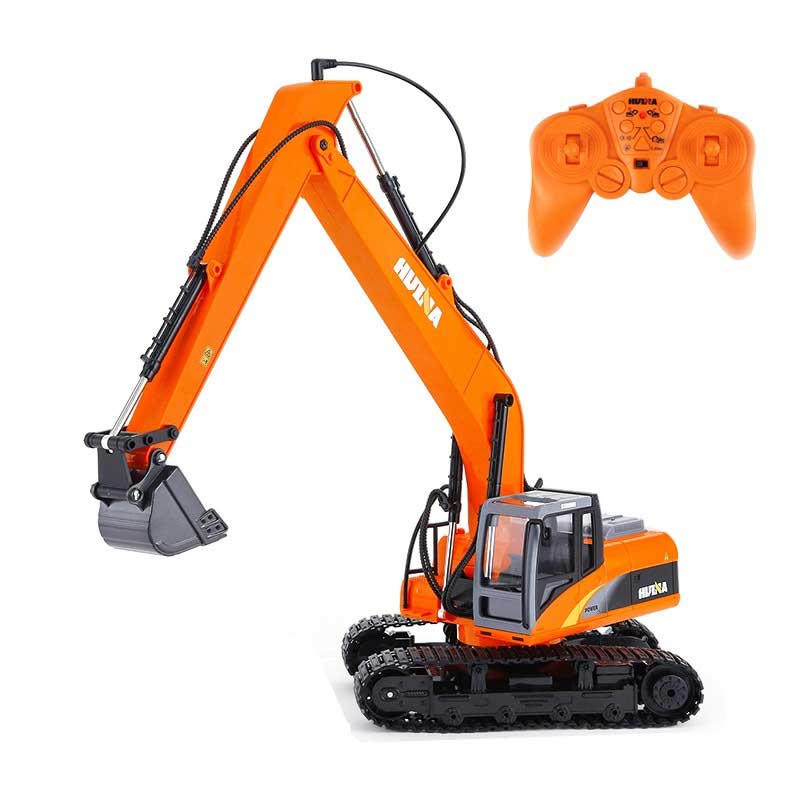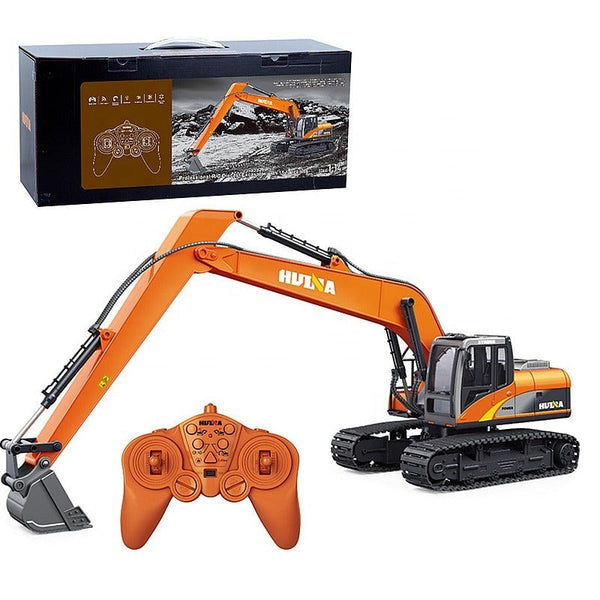How a rc excavator Can Transform Your Earthmoving Tasks
Wiki Article
Discover the Value of Excavator in Modern Construction Projects
Excavators are crucial devices in contemporary construction tasks. Their convenience enables them to perform a variety of tasks, from excavating and grading to demolition and website preparation. Advanced attributes, such as hydraulic accessories and general practitioners, improve their abilities and performance on job sites. As the industry progresses, the value of excavators grows a lot more. Comprehending their function can disclose understandings into the future of building and construction techniques. What lies in advance for these machines?The Adaptability of Excavators in Numerous Projects
Although excavators are commonly connected with massive building and construction jobs, their adaptability permits them to be utilized in a vast array of applications, from domestic landscape design to utility maintenance. In metropolitan settings, excavators can browse tight rooms to dig structures for homes or mount drain systems. Their ability to execute delicate jobs makes them ideal for landscape design tasks, where they can excavate for fish ponds or plant trees. Additionally, excavators play a necessary duty in utility maintenance, effectively excavating trenches for pipes or cable televisions without interfering with bordering locations. In farming applications, they help in land clearing up and soil preparation. Their versatility enables them to be equipped with various add-ons, improving their performance throughout different jobs. This multifaceted nature of excavators not only improves various construction processes yet additionally demonstrates their essential function in modern-day facilities advancement and upkeep.Key Attributes and Sorts Of Excavators
The conversation on essential attributes and sorts of excavators highlights the important qualities that make these makers very useful in construction. Various excavator kinds, each designed for specific jobs, show their versatility and efficiency across different applications. rc excavator. Understanding these classifications and functions is essential for optimizing their usage in modern building and construction tasksExcavator Enters Summary
Excavators play an essential duty in contemporary building and construction, supplying flexibility and effectiveness throughout numerous tasks. These heavy machinery systems been available in a number of kinds, each customized for details applications. One of the most typical kinds consist of spider excavators, recognized for their stability on irregular terrain, and rolled excavators, which offer better flexibility on paved surfaces. Tiny excavators are favored for tight spaces and small-scale projects, while long-reach excavators are made for deep excavating. Furthermore, there are specialized excavators, such as hydraulic excavators, which enhance power and accuracy. Each type includes unique capacities, making them crucial for jobs varying from excavating and grading to demolition and material handling. Recognizing these variants permits construction professionals to select the best excavator for their job needs.Key Features Explained
Comprehending the essential functions of excavators enhances their effective application in construction jobs. Excavators are defined by their effective hydraulic systems, which offer the necessary pressure for excavating, lifting, and moving materials. Their articulated arms enable for a wide variety of movement, helping with exact operations in constrained spaces. Furthermore, the selection of accessories, such as containers, grapples, and augers, broadens their versatility to meet different job requirements. The size and weight of excavators likewise add to their stability and maneuverability on different terrains. Moreover, advancements in technology have actually resulted in the integration of general practitioner and automation, enhancing precision and performance in excavation tasks. These features collectively position excavators as essential devices in modern-day construction.Applications in Building and construction
Transforming building and construction sites, excavators play an essential duty throughout various applications, ranging from property building projects to massive infrastructure advancements. These versatile devices are geared up for jobs such as excavating structures, trenching for energies, and website grading. Various kinds of excavators, including spider, wheeled, and mini excavators, offer certain benefits customized to the job demands. Spider excavators succeed in harsh surfaces, while wheeled excavators offer wheelchair on paved surface areas. Miniature excavators are ideal for confined spaces, making them popular in city setups. The performance and power of excavators substantially speed up building procedures, ensuring timely job completion. Their adaptability even more improves their value, allowing building teams to tackle a diverse selection of difficulties properly.Enhancing Performance and Efficiency on Task Sites
Taking full advantage of effectiveness and performance on work websites is an essential goal in modern-day building. Excavators play a critical role in achieving this objective by enhancing various jobs. Their capability to carry out several features-- such as grading, digging, and lifting-- decreases the need for extra equipment, thereby conserving time and resources.Moreover, excavators enhance workflow by enabling faster completion of tasks. With innovative features like hydraulic accessories and general practitioners innovation, they can perform exact procedures that reduce errors and remodel. This precision not only improves the top quality of work however also maximizes material usage, contributing to set you back savings.The convenience of excavators enables them to adjust to different site problems, making sure that jobs progress smoothly no matter of obstacles. By integrating excavators into construction processes, teams can greatly boost their total performance, leading to timely job conclusion and enhanced productivity.Safety And Security Benefits of Making Use Of Excavators
Excavators substantially improve safety and security on building and construction websites through enhanced driver presence and lowered manual work risks. By giving operators with a clear sight of their environments, excavators help to avoid crashes and injuries. Furthermore, the equipment lessens the need for workers to take part in dangerous manual tasks, additionally promoting a more secure workplace.Enhanced Driver Exposure
Construction sites can be chaotic and filled up with possible threats, improved operator visibility plays a crucial function in making sure safety and security when utilizing excavators. Modern excavators are designed with big, unobstructed home windows and strategically placed mirrors, enabling operators to keep a clear view of their surroundings (rc excavator). This enhanced presence is crucial for detecting pedestrians, other machinery, and various challenges, significantly minimizing the danger of crashes. Additionally, numerous excavators integrate sophisticated innovation, such as sensing units and cams, to provide drivers with added viewpoints, additionally boosting recognition. The capability to see even more plainly not just help in efficient procedure yet likewise promotes a more secure job setting, making it much easier for operators to browse complicated construction websites without compromising safety and security criteriaReduced Manual Work Risks
When manual work is decreased through making use of excavators, countless safety advantages arise, significantly boosting the health of building and construction workers. Excavators minimize the physical stress related to hefty training and repetitive tasks, successfully reducing the danger of bone and joint injuries. By automating processes such as excavating, grading, and moving products, they permit workers to maintain a much safer range from potential dangers. Furthermore, excavators are geared up with sophisticated safety and go to this website security attributes, such as rollover security systems and improved websites operator functional designs, which better guard workers on website. The outcome is a significant reduction in workplace crashes and injuries, leading to increased efficiency and morale amongst building and construction groups. Eventually, the fostering of excavators adds to a more secure and extra effective building environment.Excavators in Earthmoving and Website Prep Work
In contemporary building, a significant section of earthmoving and website preparation tasks depends on the efficiency and adaptability of excavators. These makers are designed to handle various dirt types and surface, making them important for rating, digging, and trenching activities. Their hydraulic arms can be geared up with various accessories, such as containers and augers, allowing operators to tailor their technique based upon certain job requirements.Excavators stand out at moving large volumes of earth rapidly and effectively, which accelerates the total building and construction timeline. They can browse limited areas and challenging websites where conventional devices might struggle, boosting performance. In addition, the accuracy of excavators assurances that website preparation sticks to strict specs, lessening the danger of mistakes that can cause pricey rework.The Function of Excavators in Demolition Tasks
Excavators play an important role in demolition tasks, as they possess the power and agility needed to take apart structures successfully. Equipped with various accessories such as hydraulic breakers, shears, and grapples, these makers can adjust to different demolition demands, whether for little structures or large commercial websites. Their flexibility enables drivers to take on complex projects while keeping security and precision.In enhancement to their demolition capacities, excavators facilitate debris removal, guaranteeing that job websites stay secure and organized. By damaging down structures right into workable items, they permit structured clearing and recycling of products, lining up with modern-day sustainability efforts.Moreover, excavators can access tight rooms and browse uneven surface, making them important in metropolitan demolition tasks. Overall, their robust style and multifunctionality make excavators a vital property in the demolition phase of building and construction, adding substantially to task timelines and performance.

Future Patterns in Excavator Modern Technology and Usage
As the building industry evolves, advancements in excavator modern technology are poised to change their usage and performance substantially. One significant trend is the integration of automation and synthetic knowledge, allowing excavators to operate with minimal human intervention. This change will certainly enhance precision in tasks such as grading and trenching, minimizing human error and boosting productivity.Additionally, the surge of electrical and hybrid excavators is shaping a more sustainable construction setting, lowering carbon discharges and gas expenses. Improved telematics systems are additionally emerging, allowing real-time tracking of machine performance and maintenance requirements, which can result in better functional performance and longer devices lifespan.Moreover, advancements in attachment technology are expanding the flexibility of excavators, enabling them to carry out a wider series of jobs. The combination of these patterns shows a future where excavators are smarter, greener, and much more versatile, inevitably reshaping building and construction task characteristics.
Often Asked Questions
Just How Do Excavators Compare to Various Other Building Equipment?
Excavators, characterized by their flexibility and power, stand out in excavating and earthmoving contrasted to various other equipment. Their ability to perform numerous tasks, consisting of lifting and demolition, makes them important in building and construction projects, enhancing overall efficiency.
What Is the Typical Life Expectancy of an Excavator?
The typical life expectancy of an excavator generally ranges from 7,000 to 10,000 operating hours, relying on upkeep, use problems, and model. Proper care can prolong this lifespan, making sure peak efficiency throughout its functional years.go to website
Exactly How Are Excavators Maintained for Optimal Efficiency?
Excavators require routine maintenance for peak efficiency, including routine examinations, fluid checks, filter substitutes, and timely fixings. Carrying out a preventive maintenance routine assists extend their life-span and assurances reliable operation in different construction settings.What Are the Prices Related To Renting vs. Buying an Excavator?
The expenses connected with renting out versus purchasing an excavator vary substantially. Renting out deals lower upfront expenses however can build up gradually, while acquiring requires a significant initial financial investment, however offers lasting cost savings and possession possession benefits.What Training Is Called For to Operate an Excavator?
Operating an excavator calls for specialized training, commonly including security methods, machine procedure methods, and ecological understanding. Accreditation programs often mandate sensible experience, enabling operators to deal with different jobs successfully while ensuring compliance with industry guidelines. The most usual kinds include crawler excavators, known for their stability on unequal surface, and wheeled excavators, which supply better wheelchair on smooth surfaces. Miniature excavators are preferred for small tasks and tight rooms, while long-reach excavators are designed for deep digging. Additionally, there are customized excavators, such as hydraulic excavators, which improve power and accuracy. Different kinds of excavators, including spider, rolled, and mini excavators, give certain benefits tailored to the task requirements. Spider excavators excel in rough surfaces, while rolled excavators use movement on paved surface areas.Report this wiki page